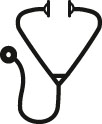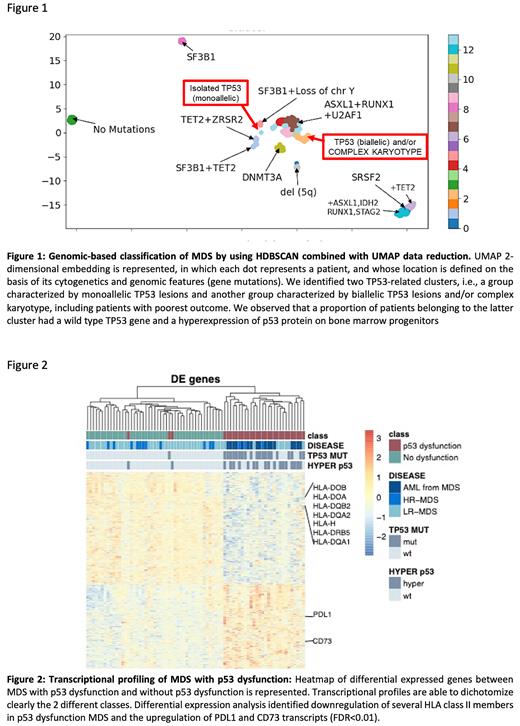Abstract

BACKGROUND. Among patients with myelodysplastic syndrome (MDS), 8-10% have mutations in TP53 gene. TP53-mutated MDS represent a distinct disease entity associated with reduced survival, which is even poorer in those patients with a biallelic TP53 disruption. Recent data indicate that non-mutational p53 dysfunction may occur in different type of cancers as a result of different inactivating mechanisms.
SCIENTIFIC AIM. We aimed to evaluate p53 genotype and functional phenotype (p53 dysfunction) in MDS. We analysed TP53 gene mutational status, loss of 17p and p53 protein expression on bone marrow progenitor cells (as assessed by immunohistochemistry, IHC) in 1,244 MDS patients. RNA-seq analysis of isolated CD34+ progenitors and high-dimensional flow cytometry analysis of immune cell populations were also performed in selected cases.
RESULTS We first performed a clustering analysis on whole MDS population to define genomic-based entities and we identified two TP53-related clusters, i.e., a group characterized by monoallelic TP53 lesions and another group characterized by biallelic TP53 lesions and/or complex karyotype, including patients with poorest outcome. We observed that a proportion of patients belonging to the latter cluster had a wild type TP53 gene and a hyperexpression of p53 protein on bone marrow progenitors (Figure 1). These subjects account for 5% of whole MDS population and had the same dismal outcome as TP53-mutated MDS (median overall survival was 15 and 14 months, respectively) together with high risk of leukemic evolution, high rate of disease relapse after transplantation and short duration of response to hypomethylating agents.
We performed RNA-seq on CD34+ progenitors in two different MDS cohorts (learning cohort, n=75 and validation cohort, n=34; only results that were consistent in both cohorts were reported). TP53-mutated MDS and non-mutated MDS with p53 hyperexpression had a similar gene expression profile that was clearly distinct from that of MDS without p53 dysfunction (Figure 2). Both TP53-mutated MDS and MDS with p53 hyperexpression showed a significant impairment in p53 pathway targets (MSigDB, p<.01) thus suggesting comparable p53 dysfunction. In MDS with p53 hyperexpression a significant over-expression of the p53 negative regulator MDM2 (p<0.01) was found, which has been confirmed by MDM2 IHC staining on bone marrow progenitors.
According to these findings non-mutational p53 dysfunction may occur in MDS as a result of inactivating mechanisms such as MDM2 overexpression, thus suggesting the definition of a new disease category called "MDS with p53 dysfunction" including TP53-mutated patients together with subjects with non-mutational p53 dysfunction.
Differential expression analysis on CD34+ progenitors showed that in MDS with p53 dysfunction downregulated genes are enriched in innate and adaptive immune system pathways, whereas the upregulated genes are enriched in stress-related pathways and Myc signaling (p<0.01), thus suggesting an immunosuppressive phenotype in these patients. Accordingly, CD34+ progenitors from MDS with p53 dysfunction showed a significant downregulation of HLA class II members and their master regulator CIITA (p<0.01), and the up-regulation of the immunosuppressive enzyme CD73 (p<0.01). Moreover, an increase of anti-inflammatory cytokines and a reduction of pro-inflammatory ones (interferon-gamma (IFN-γ) and IL-33) was observed in MDS with p53 dysfunction (p<0.01).
High-dimensional flow cytometry analysis of bone marrow cells was performed in both learning and validation cohorts. Naïve T cells were significantly increased in MDS without p53 dysfunction (p<0.01), whereas T-regulatory cells (Tregs) and Tissue Resident Memory T cells were increased in MDS with p53 dysfunction (p<0.01). MDS with p53 dysfunction showed increased PD1 expression on CD8+ cells (p<0.01) together with a strong upregulation of PDL1 transcript on CD34+ cells (p<0.01). Finally, MDS with p53 dysfunction showed a reduction of cytotoxic NKp46+ and NKp30+ cells populations and an increased frequency of PD1+ NK cells (p<0.01).
CONCLUSIONS. In MDS both mutational and non-mutational p53 dysfunction are associated with poor survival and resistance to conventional treatments. These subjects have a distinct immunosuppressive profile that could be the primary driver of the dismal prognosis found in these patients.
Disclosures
Kulasekararaj:Novo Nordisk: Consultancy, Honoraria, Speakers Bureau; Sobi: Consultancy, Honoraria, Speakers Bureau; Pfizer: Consultancy, Honoraria, Speakers Bureau; Samsung: Consultancy, Honoraria, Speakers Bureau; Novartis: Consultancy, Honoraria, Research Funding, Speakers Bureau; F. Hoffmann-La Roche: Consultancy, Honoraria, Speakers Bureau; Celgene: Consultancy, Honoraria, Research Funding, Speakers Bureau; Biocryst: Consultancy, Honoraria, Speakers Bureau; Apellis: Consultancy, Honoraria, Speakers Bureau; Amgen: Consultancy, Honoraria, Speakers Bureau; Alexion, AstraZeneca Rare Disease: Consultancy, Honoraria, Speakers Bureau; Akari: Consultancy, Honoraria, Speakers Bureau; Achillion: Consultancy, Honoraria, Speakers Bureau; Ra Pharma: Consultancy, Honoraria, Speakers Bureau. Lugli:Bristol Myers Squibb: Research Funding. Santoro:Celgene: Speakers Bureau; Servier: Membership on an entity's Board of Directors or advisory committees, Speakers Bureau; Gilead: Membership on an entity's Board of Directors or advisory committees, Speakers Bureau; Bristol Myers Squibb: Membership on an entity's Board of Directors or advisory committees, Speakers Bureau; Roche: Speakers Bureau; Bayer: Membership on an entity's Board of Directors or advisory committees, Speakers Bureau; Novartis: Speakers Bureau; AstraZeneca: Speakers Bureau; Eisai: Membership on an entity's Board of Directors or advisory committees, Speakers Bureau; Sandoz: Speakers Bureau; Eli-Lilly: Speakers Bureau; Abb-vie: Speakers Bureau; Merck Sharp & Dohme: Membership on an entity's Board of Directors or advisory committees, Speakers Bureau; Sanofi: Consultancy; Amgen: Speakers Bureau; Pfizer: Membership on an entity's Board of Directors or advisory committees, Speakers Bureau; Takeda: Speakers Bureau; Incyte: Consultancy. Diez-Campelo:Takeda: Honoraria, Membership on an entity's Board of Directors or advisory committees; BluePrint: Membership on an entity's Board of Directors or advisory committees; Bristol Myers Squibb: Consultancy, Honoraria, Membership on an entity's Board of Directors or advisory committees, Research Funding; Novartis: Consultancy, Honoraria, Membership on an entity's Board of Directors or advisory committees. Sanz:La Hoffman Roche Ltd.: Other: Advisor or review panel participant; Novartis Oncology: Consultancy; Celgene Corporation: Consultancy; Abbvie Pharmaceuticals: Other: Advisor or review panel participant; takeda: Honoraria; Janssen Pharmaceuticals, Inc.: Other: Teaching and Speaking; Helsinn: Honoraria, Other: Advisor or review panel participant; Takeda Pharmaceuticals Ltd: Other: Advisor or review panel participant. Platzbecker:BMS/Celgene: Honoraria; Abbvie: Honoraria; Jazz: Honoraria; Geron: Honoraria; Janssen: Honoraria; Silence Therapeutics: Honoraria; Takeda: Honoraria; Novartis: Honoraria. Santini:AbbVie: Honoraria; BMS: Honoraria, Membership on an entity's Board of Directors or advisory committees; Gilead: Honoraria, Membership on an entity's Board of Directors or advisory committees; Menarini: Honoraria, Membership on an entity's Board of Directors or advisory committees; Geron: Honoraria, Membership on an entity's Board of Directors or advisory committees; Otsuka: Honoraria, Membership on an entity's Board of Directors or advisory committees; Takeda: Honoraria, Membership on an entity's Board of Directors or advisory committees; Syros: Membership on an entity's Board of Directors or advisory committees; Srvier: Membership on an entity's Board of Directors or advisory committees; Novartis: Honoraria. Kordasti:Novartis: Membership on an entity's Board of Directors or advisory committees, Research Funding; Alexion: Speakers Bureau; BMS: Research Funding; MorphoSys: Research Funding; Beckman Coulter: Speakers Bureau. Fenaux:Jazz: Consultancy, Honoraria, Research Funding; Takeda: Honoraria, Research Funding; Novartis: Consultancy, Honoraria, Research Funding; Janssen: Consultancy, Honoraria, Research Funding; BMS: Consultancy, Honoraria, Research Funding; Abbvie: Consultancy, Honoraria, Research Funding; Celgene/BMS: Honoraria, Research Funding; Syros Pharmaceuticals: Honoraria. Haferlach:Munich Leukemia Laboratory: Current Employment, Other: Part ownership.
Author notes
 This icon denotes a clinically relevant abstract
This icon denotes a clinically relevant abstract
Asterisk with author names denotes non-ASH members.


This feature is available to Subscribers Only
Sign In or Create an Account Close Modal